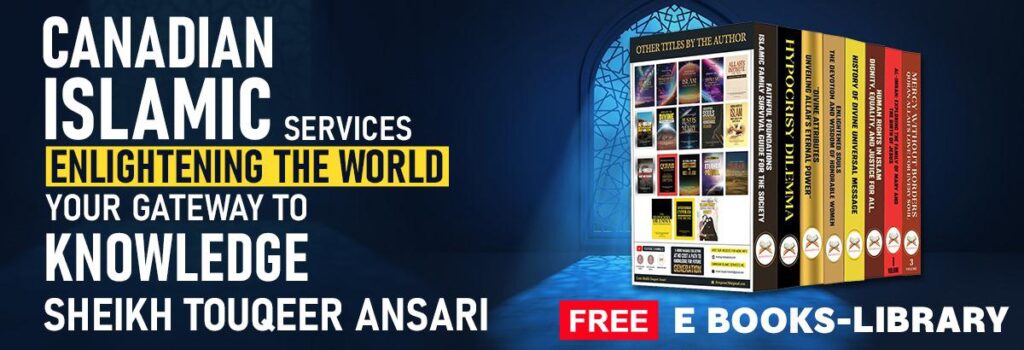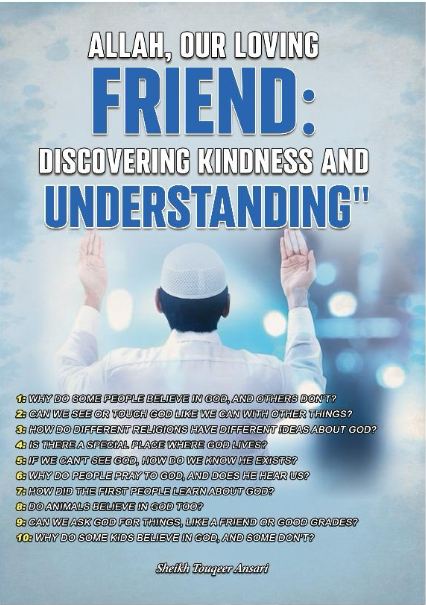Q. Why do some people believe in Allah, and others don’t?
People have different beliefs influenced by their experiences, upbringing, and personal reflections. Some have knowledge about Allah, while others do not.
Q. Can we see or touch Allah like we can with other things?
No, Allah is often considered a spiritual being and not directly visible or tangible.
Q. How do different religions have different ideas about Allah?
Religions develop unique beliefs based on their traditions, cultures, and interpretations of divine experiences. That’s why Allah sent 124,000 prophets to guide mankind in understanding the true religion of Islam.
Q. Is there a special place where Allah lives?
Above the heavens, on His Throne.
Q. If we can’t see Allah, how do we know He exists?
There are many things we cannot see, like signals for electronic communication devices, thoughts, vision, hearing, speech, pain, hunger, oxygen, and the soul. Many other unseen realities exist, including Allah.
Q. Why do people pray to Allah, and does He hear us?
Prayer is a way for people to communicate with Allah, and believers often feel that He listens if we are sincere in our prayers.
Q. How did the first people learn about Allah?
The existence of Allah has historical roots in early human experiences. Through prophets sent by Allah, people attempted to understand the existence of Allah.
Q. Do animals believe in Allah too?
Yes, every creature living on earth or in the ocean, whether small or big, worships Allah.
Q. Can we ask Allah for things, like a friend or good grades?
Muslims and many people believe they can pray to Allah for guidance, support, and blessings.
Q. Why do some kids believe in Allah, and some don’t?
Belief often depends on a child’s upbringing, education about Allah’s existence, and teachings of Prophet Muhammad (peace be upon Him). Some may not believe due to cultural surroundings and negative thoughts.
Q. Did Allah create everything, or did it happen by itself?
Different beliefs exist due to a lack of knowledge. Nothing comes into existence in this world or the universe without Allah creating everything.
Q. Can we draw a picture of Allah, or is He invisible?
Allah is invisible; no human has seen Allah, so drawing a picture is not possible.
Q. Is Allah a boy or a girl, or something else?
Allah is not like His creatures; He begets not, nor was He begotten.
Q. Why do people talk about Allah when someone passes away?
Discussing Allah provides comfort, meaning, and hope during times of grief.
Q. How do we know Allah is good if we can’t see Him doing things?
Believers often attribute goodness to Allah based on moral teachings and commands that forbid evil and promote good, as found in the Quran and the teachings of His prophets.
Q. Can God stop bad things from happening?
Allah gave us free will in our lives to test us for the Day of Judgment. We are either punished or rewarded in paradise based on our behavior in this world, according to Allah’s commands.
Q. What happens when we die, according to Allah?
Religions sent by Allah propose an afterlife or a Judgment Day based on one’s actions in life.
Q. How did people decide what Allah likes or doesn’t like?
Religious texts like the Quran, traditions, and teachings from the last prophet, Muhammad (peace be upon him), guide believers on moral conduct and Allah’s preferences.
Q. Can we be friends with Allah like we have friends at school?
Islamic religious teachings emphasize a close personal relationship with Allah, akin to friendship.
Q. Does everyone believe in the same Allah, or are there different Gods?
There is supposed to be one Almighty God, Allah. The first man, Adam, worshipped Allah. However, as time passed, his descendants created millions of gods, regardless of their status and education.
Q. Who is the creator of Allah?
How can anyone be the creator of Allah? All existence in this world or the universe is made of some material, and Allah is the creator of all the material. Whatever exists, the creator of the material cannot be material, and no one has seen Allah.
Q. How can you prove that Allah is the only one?
Everything started with one—hands, eyes, ears, stars, as we know. Everything is based on one. How can God be more than one? If there were two gods, they would fight and try to impose themselves on each other, claiming to be a better creator. They would bring all their might to fight each other. Everybody looks different.
Q. People believe there are hundreds of thousands of statue gods or god helpers in the world. But I see and realize that statues are made of wood, stones, silver, and gold, claiming to be gods or god helpers. It means anything made from material cannot be Allah.
Q. How is God supposed to be?
An unseen power and creator of all existence in this world or the universes. Quran Chapter 112 bears witness: “Say, He is Allah, the One. Allah, the Eternal Refuge. He neither begets nor is born, nor is there to Him any equivalent.”
Now I understand how they cannot be gods or god helpers. They are made of material without action, feeling, or power. How can they be gods or god helpers?
Some Attributes of ALLAH
Al-Rahman (The Most Merciful) and Al-Rahim (The Most Compassionate):
- Advanced research explores the nuanced differences between these two names, highlighting how Al-Rahman signifies Allah’s universal mercy encompassing all of creation, while Al-Rahim emphasizes His specific and continuous mercy towards believers.
Al-‘Aleem (The All-Knowing):
- Advanced studies delve into the profound nature of Allah’s knowledge, discussing His knowledge of the past, present, and future, and how His knowledge is not bound by time or limitations.
Al-Qudus (The Holy):
- Research on the attribute of holiness examines how Allah is free from any imperfection or impurity, emphasizing His absolute purity and sanctity.
Al-Malik (The Sovereign) and Al-Malik (The King):
- Scholars explore the divine sovereignty and kingship of Allah, discussing how His authority extends over all aspects of creation and governance.
Al-Wadud (The Loving):
- Advanced research on Allah’s love analyzes the nature of His love for His creation, emphasizing unconditional and boundless love, as well as the reciprocal love that believers are encouraged to cultivate.
Al-Ghaffar (The Forgiving), Al-Ghafoor (The All-Forgiving), Al-Afuw (The Pardoner):
- Studies delve into the multifaceted nature of Allah’s forgiveness, exploring how these names reflect different aspects of His pardon, covering sins and granting believers opportunities for repentance.
Al-Qawiyy (The All-Powerful) and Al-Azeez (The Almighty):
- Research on Allah’s attributes of strength and might examines how His power is absolute and unrivaled, and how this power is used with wisdom and justice.
As-Sami’ (The All-Hearing) and Al-Basir (The All-Seeing):
- Advanced understanding of these attributes involves exploring the comprehensive nature of Allah’s hearing and seeing, encompassing not only physical senses but also awareness of the innermost thoughts and intentions of His creation.
Al-Hakam (The Judge) and Al-Adl (The Just):
- Research on divine justice examines how Allah’s judgments are based on perfect wisdom, fairness, and equity, transcending human understanding.
Al-Mujib (The Responsive):
- Advanced studies on Allah’s attribute of responsiveness explore how He answers the prayers of believers, taking into account the various ways in which prayers are answered, whether in the form of granting requests or providing what is better for the individual.

